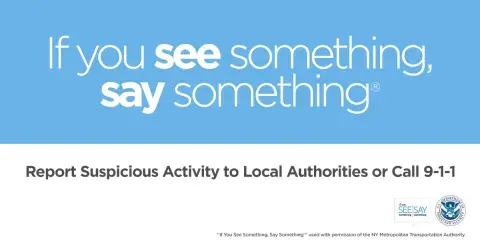SAR Training Courses
The Nationwide SAR Initiative (NSI) is a multifaceted approach designed to increase the effectiveness of state, local, tribal, and territorial (SLTT) law enforcement and public safety professionals and other frontline partners in identifying, reporting, evaluating, and sharing per-incident terrorism indicators to prevent acts of terrorism.
To increase the effectiveness of this multifaceted approach, the NSI has developed training courses for frontline officers and hometown security partners to provide an overview of the NSI, the 16 SAR Indicators and Behaviors and the SAR process, as well as training regarding how to identify behaviors and indicators that may indicate terrorism-related criminal activity and how to report identified suspicious activity to the proper authorities while maintaining the protection of citizens’ privacy, civil rights, and civil liberties.
Prior to completing a course, please review the Suspicious Activity Reporting Indicators and Behaviors checklist. This tool for analysts and investigators details potential criminal or noncriminal activities requiring additional information during the vetting process or investigation, as well as defined criminal activity and potential terrorism nexus activity.
-
Line Officer Training (Version 3)
Length: 24:00The goal of this course is to train frontline officers in their role of observing and reporting suspicious activity in accordance with the NSI SAR Functional Standard. Frontline officers are integral to the first two steps of the SAR Process (gathering and documenting). Completing these steps properly is often the key to connecting the dots between nationwide patterns and trends. The first half of the training aims to aid emergency management professionals in their duty to recognize what kinds of suspicious behaviors are associated with pre-incident terrorism activities; protect privacy, civil rights, and civil liberties when documenting information; and understand how and where to report suspicious activity. The second half of this course presents a real-world example that details the procedures and expectations of frontline professionals in reference to SAR.
Launch -
Private Sector Security
Length: 31:14The goal of this course is to train private sector security officers (PSOs) in their role of observing and reporting suspicious activity in accordance with the NSI SAR Functional Standard. PSOs often work in tandem with law enforcement and other public safety officials. The ability of PSOs to properly report suspicious activity can sometimes be an invaluable contribution for public safety officials seeking to search for connections that indicate terrorist or otherwise criminal activity. The first half of the training aims to teach private sector security officers what kinds of suspicious behaviors are associated with pre-incident terrorism activities and how and where to report suspicious activity. The second half of this course presents three scenarios that detail the procedures and expectations of frontline professionals regarding SAR.
Launch -
Fire/Emergency Medical Services (EMS)
Length: 33:16The goal of this course is to train hometown security partners (Fire/EMS professionals) in their role of observing and reporting suspicious activity in accordance with the NSI SAR Functional Standard. This is especially important due to the ability of Fire/EMS professionals to encounter indicators of terrorist activity in the course of their daily duties. The first half of the training aims to aid emergency management professionals in their duty to recognize what kinds of suspicious behaviors are associated with pre-incident terrorism activities; protect privacy, civil rights, and civil liberties when documenting information; and understand how and where to report suspicious activity. The second half of this course presents two scenarios that detail the procedures and expectations of Fire/EMS professionals in reference to SAR. The training concludes by providing real-world examples of how the Fire/EMS community was integral in the resolution of national SAR incidents.
Launch -
Emergency Management
Length: 30:59The goal of this course is to train emergency management professionals in their role of observing and reporting suspicious activity in accordance with the NSI SAR Functional Standard. The first half of the training aims to aid emergency management professionals in their duty to recognize what kinds of suspicious behaviors are associated with pre-incident terrorism activities; protect privacy, civil rights, and civil liberties when documenting information; and understand how and where to report suspicious activity. The second half of this course presents two scenarios that detail the procedures and expectations of emergency management professionals in reference to SAR. The training concludes by providing two real-world examples of how the Emergency Management community was integral in the resolution of SAR incidents that had national implications.
Launch -
Explosive Precursors Point of Sale
Length: 37:59The goal of this course is to raise awareness for point-of-sale retailers of potential explosive precursor components of the documented and verified indicators and behaviors that when viewed in context of facts and circumstance may indicate potential terrorist planning or other criminal acts. This is especially important due to the ability of retailers to detect indicators of the development of homemade explosives. The first half of the training aims to aid retailers in their ability to recognize what kinds of suspicious behaviors are associated with pre-incident terrorism activities and understand how and where to report suspicious activity. The second half of this course presents three real-world examples of how the point-of-sale retailers of potential explosive precursor components were integral in the resolution of SAR incidents.
Launch -
Public Safety Telecommunications
Length: 37:46The goal of this course is to train public safety telecommunication specialists (e.g. dispatchers) on the documented and verified indicators and behaviors that, when viewed in context of facts and circumstance, may indicate potential terrorist planning or other criminal acts. It is also designed to teach public safety telecommunication specialists the types of questions to ask to elicit the most helpful information for a SAR. This is especially important due to the unique responsibility that dispatchers have in their role as the ultimate frontline of response and prevention while serving as the primary link between the public and public safety agencies. The first half of the training aims to aid public telecommunications specialists in their ability to recognize what kinds of suspicious behaviors are associated with pre-incident terrorism activities and understand how and where to report suspicious activity. The second half of this course presents three scenarios that detail the procedures and expectations of dispatchers in reference to SAR. The training concludes by providing a real-world example of how the dispatchers were integral in the resolution of a SAR incident.
Launch -
Public Health and Health Care Partners
Length: 34:52The goal of this course is to raise awareness in the public healthcare industry of the documented and verified indicators and behaviors that when viewed in context of facts and circumstance may indicate potential terrorist planning or other criminal acts. This is especially important due to the ability of public healthcare professionals to detect indicators of bioterrorism. The first half of the training aims to aid public healthcare workers in their ability to recognize what kinds of suspicious behaviors are associated with pre-incident terrorism activities and understand how and where to report suspicious activity. The second half of this course presents four scenarios that detail the procedures and expectations of public healthcare professionals in reference to SAR.
Launch -
Maritime
Length: 33:11The goal of this course is to train hometown security partners (maritime industry professionals) in their role of observing and reporting suspicious activity in accordance with the NSI SAR Functional Standard. This is especially important due to the ability of maritime industry professionals to operate in and around critical infrastructure facilities and key resource sites that are integral to the nation. The first half of the training aims to aid hometown security partners in their duty to recognize what kinds of suspicious behaviors are associated with pre-incident terrorism activities; protect privacy, civil rights, and civil liberties when documenting information; and understand how and where to report suspicious activity. The second half of this course presents three scenarios that detail the procedures and expectations of maritime industry professionals in reference to SAR.
Launch -
Probation/Parole/Corrections
Length: 39:13The goal of this course is to train hometown security partners (probations, parole, and correctional officers) in their role of observing and reporting suspicious activity in accordance with the NSI SAR Functional Standard. This is especially important due to the ability of correctional officers to interact daily with individuals who may exhibit behaviors or engage in activities that have a potential nexus to terrorism. The first half of the training aims to aid hometown security professionals in their duty to recognize what kinds of suspicious behaviors are associated with pre-incident terrorism activities; protect privacy, civil rights, and civil liberties when documenting information; and understand how and where to report suspicious activity. The second half of this course presents four scenarios that detail the procedures and expectations of hometown security officers in reference to SAR.
Launch
Bystander Awareness Training
-
Foundations of Targeted Violence Prevention eLearning
Length: 1:00:00This course was designed to educate the public on threatening or potentially concerning behaviors, inform them of the importance of reporting these behaviors, and direct them on how to properly report these concerns. Reporting behaviors that indicate targeted violence provides an opportunity for intervention to prevent targeted violence from occurring. This training was designed to help facilitate these reports by teaching community members how to recognize threats and potential indicators of targeted violence and what to do once they recognize them.
Launch















